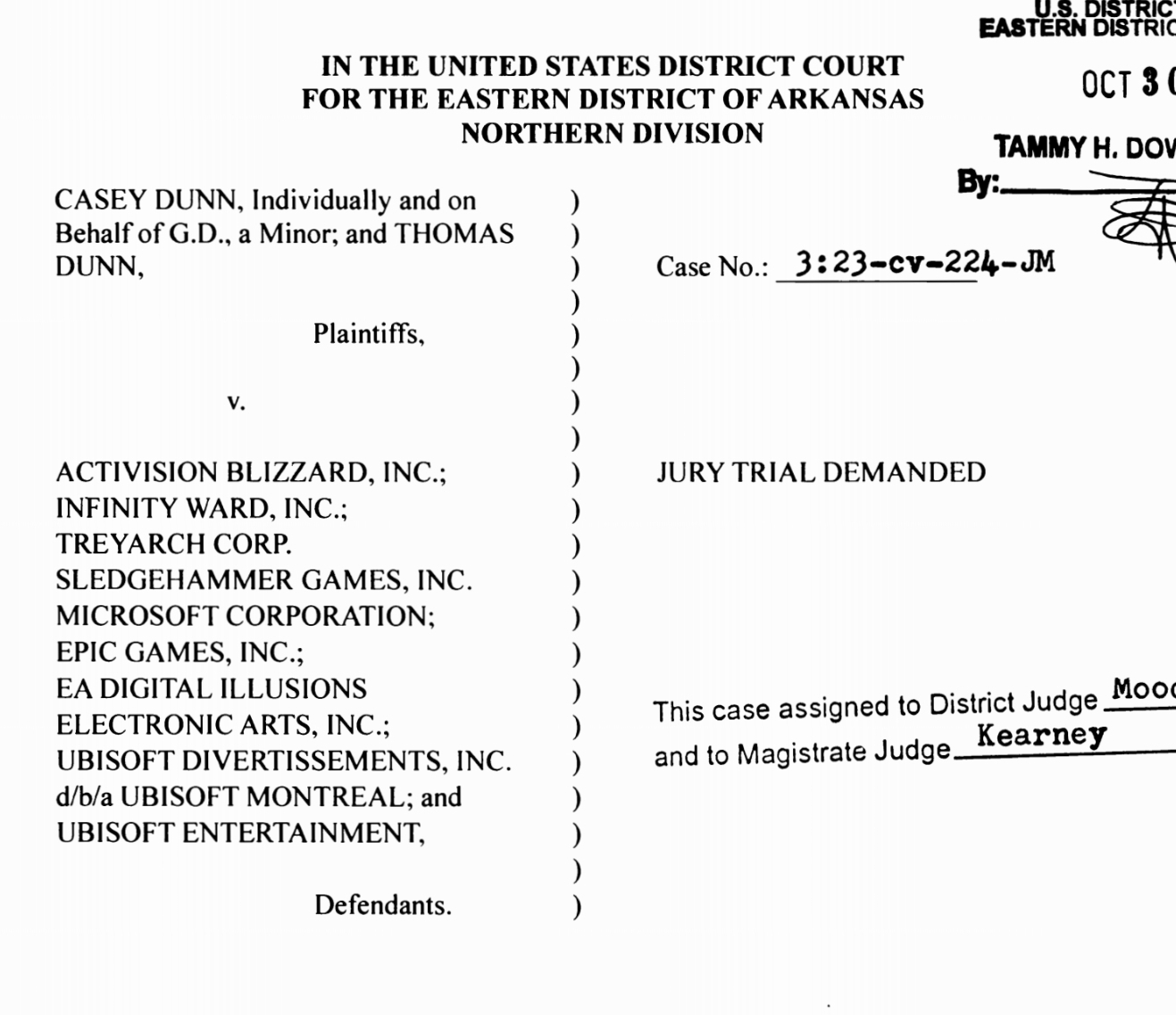Parents Sue Gaming Companies Over ‘Video Game Addiction’, Because That’s Easier Than Parenting::Video game addiction. Sigh. Big sigh, even. Like, the biggest of sighs. We’ve talked about claims that video game addiction is a documentable affliction in the past, as well as the pushback that claim has received from addiction experts, who have pointed out that much of this is being done to allow doctors to get…
This author seems pretty comfortable mocking the concept of games being addictive.
Loot boxes need to stop for sure, but things like limited-time content are 100% designed to form habits and ultimately feed gaming addiction. Season passes or weekly achievements require you to log on and grind out challenges at regular intervals to avoid missing out on rewards that are required for competitive play.
I know plenty of people who have had to make an active choice to stop playing certain games because they found they couldn’t play the game ‘on their own terms’. It sucks as an adult, but kids without fully developed brains capable of rational thinking would stand no chance.
things like limited-time content are 100% designed to form habits and ultimately feed gaming addiction. Season passes or weekly achievements require you to log on and grind out challenges at regular intervals to avoid missing out on rewards that are required for competitive play.
Hell, even subscription-based games like MMOs. After all, if you’re paying every month for something, you want to get your money’s worth.
There’s a reason I used to call it World of Warcrack. That game was harder to quit than smoking cigarettes for me.
Depends on the implementation: I liked Eve Onlines model where, yes, you had to pay the sub but your character would train skills even while offline.So at least to me there was less of this classical fear of missing out.
Ugh, don’t get me started on EVE. Like yeah, there’s an awesome game underneath it all, but the fact that they make you train your character in real time by reading skill books feels so scummy when they are billing you a monthly fee. Like that has such an obvious perverse incentive. You think those skill books take as long as they take because it’s fun? No way. They take that long because it maximises profit.
I do feel like it’s kind of a bad thing that many large game devs employ psychologists specifically to come up with ways that psychologically addict players. They could be addicting even without being specifically designed that way, but going out of your way to ensure it is does, does not seem the least but ethical to me.
Like EA who use the same technics that casinos for their loot boxes. But you have better odds with casinos than EA…
EA is hardly the only one doing that. I’d even argue that there are far more offensive examples, sadly. Just look at the mobile market, it’s a cesspool of extremely exploitive tactics and even more accessible than traditional gaming.
I don’t want to be all old man yells at cloud, but back in my day popular games were played a lot because they were primarily enjoyable for the story, the achievement of completing a particular level or boss, playing against friends, etc. And sure, you’d have the odd bad parent trying to claim their kid was addicted to Counterstrike 1.6, but it was broadly speaking nonsense. The vast majority of games were offline, or had very limited online modes built around direct competition with other players (FPS, sports games, etc), and publishers would get all their money from the initial sale, with only a few games having expansion packs, most notable The Sims.
But in the early 2010s a few things changed:
- broadband internet became ubiquitous in markets with high levels of existing gamers
- distribution of games swapped from physical media to downloads
- ‘everyone’ had a pretty powerful computer in their pocket making it much more accessible
- a bunch of people in the industry started reading about positive psychology - the idea that you can create habits through rewards - and apply them to video games to increase playtime
- those mechanics turned out to be very powerful in driving particular user behaviours, and started to be targeted at monetisation models - and so we got loot boxes, etc
So we went from a situation where video games were fun for the same reasons traditional games, or sports, are fun, to one where many video games include a lot of gambling mechanics in their core gameplay loops - loot boxes being the obvious one, but any lottery-based mechanic where you spend real money counts - in an industry with no relevant regulation, nor age limitation.
It is definitely possible for people to get addicted to these mechanics, the same way people can get addicted to casino games, or betting on horse racing, especially when for some games that is literally what the developer wants.
I agree with all your major points, well said. I will only add that back in the late 90s, MMOs started to become more popular among PC gamers, and that those were definitely designed for mild addiction (to keep players paying a monthly fee).
After WoW took MMOs mainstream (by around 2010-2012 when its playerbase peaked), I feel that lines up perfectly with your observation that developers began incorporating more and more positive feedback loops into games. I only bring this up since I wonder if there’s an actual correlation there (along with the other elements you pointed out regarding accessibility, etc.) or if it’s just coincidental timing.
Has everyone forgotten coin-ops? Or maybe I’m just old.
This started a long, long time ago, pretty much at the birth of popular casual gaming. It’s not part of the evolution, it was part of the blueprint.
The thing with coin-ops, and arcades in general, is that you still had to physically go somewhere, and have the coins to keep playing. If you walked away, someone would take the machine. Worst case scenario, the machine stopped working when it ran out of coin/token space.
I’m not denying that there are similarities, and that ultimately every game ever has been built on a fundamental mechanic of risk/reward, but it was rudimentary and broadly speaking deterministic and visible to the user (you knew how to get a free ball in most pinball games, for example).
The combination of easy payments, of very high amounts, and online competitive play where the high rollers can be multi-millionaires from anywhere in the world, and a pay-to-win mechanic makes certain modern games not just addictive, but financially crippling, if played by someone susceptible to addiction.
I agree, but I was responding specifically to the claim that the use of psychology to tweak the design of a game in favour of profitability happened in 2010 / 1990 / etc.
The fact that it’s now orders of magnitude worse is, of course, true, but it didn’t start there by any definition.
It had nothing to do with WoW, smartphones were basically to blame. 2007 was when the iPhone came out, Android followed next year, and by the early 2010s, smartphones became ubiquitous. Both the App Store and Google Market exploded exponentially in the number of apps and games. Mobile game makers soon figured out that microtransactions brought in more money than upfront payments. All the popular games started exploiting this model, such as Angry Birds, Temple Run and of course the infamous Candy Crush.
King, the company behind Candy Crush, generates over a billion dollars of revenue per year - their turnover exceeding that of several traditional PC/console game makers. In 2012, they staggering 1000% growth in just an year - and that was the trigger. That was when everyone looked at them going, “tf, why the hell are we wasting so much time and money developing AAA games, and making way less money than some cheap mobile game?”
And the rest as they say, is history.
WoW is a stepping stone, it’s used as a frequent example in Reality is Broken, which is good place to start if you want to understand where all this comes from, as well as the rather utopian hope psychologists had at the time.
I was there, and it didn’t “come from” WoW. Mtx were already popular in South Korea and China, with games like MapleStory (2003) and ZT Online (2006) being early examples, which predates mtx in WoW. Farmville also had them back in 2009, around the same time WoW started selling pets. And back then Zynga were making like a $1mil a day from Farmville mtx, and this was before WoW pet sales really took off.
Yes, WoW did play a role, but it wasn’t as big as you think - after all, it had a very niche audience, whereas games like Farmville, Candy Crush, Angry Birds etc had a much wider appeal that reached out to several age groups and audiences, whilst simultaneously being a lot more accessible - which made them so much more dangerous (in terms of addiction).
WoW appealed to the hardcore MMO gamers, gamers who were used to paying for virtual goods, whereas games like Farmville normalized mtx across for the general and wider public. Paying for virtual items was no longer something that nerds did, it was a completely normal thing. And then Candy Crush tweaked the formula even further. WoW’s mtx was a lot more benign compared to some of the shady psychological designs games like Candy Crush implemented.
I absolutely agree that Farmville had a bigger impact, especially as it was geared towards a more casual market. Showing that people who would not describe themselves as gamers would spend a lot of money on games was a huge thing that a lot of people set out to copy.
I won’t read the article with such a stupid title.
In other situations they call it victim shaming. There is a reason laws exists to forbid gambling for minors. Many video games are built as loopholes to circumvent such laws. Publishers and producers must be punished for this. Parenting is not a relevant topic here, as we are talking about society.
In a society the distribution of parenting capabilities has large variability, and it does not always depends on the parents themselves, but also on environmental factors (such as work-related stressors).
As society we need to fight any predatory business model that exploits society and individuals weaknesses.
Many games work on the exact same feedback loop as gambling. Squeezing as much dopamine out of your brain as they can.
Big companies spend a huge amount on psychologists to make their games as addictive as possible.
The same way my parents had no idea how dangerous the internet could be in the late 90s, many parents won’t know about this.
This is my biggest concern about video games when I become a parent. My parents were far more concerned about “violence,” but I’d rather have a 10yo child play doom than candy crush. One might initially look more dangerous to the untrained eye, but looks can be deceiving.
100% I’ve pushed my kids towards games like Minecraft and Stardew Valley. Games that need a bit of focus and planning rather than quick fire rounds full of ads or micro transactions.
You are also not allowed as a parent to enforce your child not playing after a certain age. It will depend on the country, but where I live you are, among other things, not allowed to forbid social contacts of your child unless there is significant harm involved. No judge would see “they are playing video games at their friends house” as serious harm.
Where do you live? I’ve never heard of anything like that.
I live in Germany. You can read about the law here, for example:
One of my first tasks in my game development career was to change the data type used for the main currency in [Famously Addictive Farm Simulator Game], because a user had exceeded the maximum value.
I eventually found out approximately how much IRL money this person had spent on this game…
6 figures. And not barely 6 figures.
People don’t spend that much because they’re just having fun.
There is absolutely something different about these kinds of games. It’s abusive and dangerous, and we should consider it a health hazard.
In the past I might’ve been more critical of the parents, but honestly in this day and age?
Large publishers and developers exist to exploit people. They exploit workers by overhiring, overworking, and then firing them gracelessly whenever they’ve managed to push out the next paint-by-numbers turd they have planned. It releases to the public in an unfinished state, yet the consumer is expected to shell out hundreds of dollars not only for the base game, but for season passes, FOMO mechanics, in-game shops, gambling and other anti-consumer bullshit.
They scheme to create more and more insidious systems to keep the player hooked, all the while they’re abusing their workers, playing with their lives, and sometimes literally stealing from them.
The modern AAA gaming industry is worse than it ever has been, and these parents aren’t wrong; the games are designed to be addictive. They’d outright encourage people to mortgage their home and steal their parents’ credit cards if they thought they could get away with it.
I mean, the gambling industry uses some mobile games as learning material in how to snare players and trigger “that next button press” (source, I used to work for a large gambling company).
So, there are grounds to argue addiction on the same level as gambling addiction for some games.
Good! Hit them in the wallet for their abhorrent behavior.
If only gaming companies could figure out how to get kids addicted to algebra.
deleted by creator
The US

Purged by creator
The recent lawsuits against gaming companies over ‘video game addiction’ seem to overlook the importance of parental guidance. It’s easier to blame external factors than to address the root causes at home. The principles of the AA twelve steps teach us about taking responsibility and seeking personal growth, which can be applied to parenting as well. Just as recovering from addiction requires commitment and support, guiding children through their challenges needs consistent involvement and understanding. Instead of looking for quick fixes, parents could benefit from actively engaging in their children’s lives and setting healthy boundaries around gaming and other activities.
Yeah let’s just disregard the prevalence of gambling mechanics deliberately intended to induce addiction in minors to juice them for their parents’ cash.
True but parents have a responsibility to look at the game before letting their children play it. Should the mechanics exist? No. But should the parents look into the game beforehand? Yes
True but parents have a responsibility to look at the game before letting their children play it. Should the mechanics exist? No. But should the parents look into the game beforehand? Yes
Switch the word ‘game’ with the word ‘drug’ and the word ‘play’ with the word ‘use’, and your comment still reads the same.
We still outlaw addictive drugs.
Comment does not read the same at all, and two of the most addictive drugs, alcohol and nicotine, are legal.
Now if you’d said “we still outlaw addictive drugs FOR KIDS”, you’d be right.
Switch the word ‘game’ with the word ‘drug’ and the word ‘play’ with the word ‘use’, and your comment still reads the same.
We still outlaw addictive drugs.
Comment does not read the same at all,
Well, let’s see…
True but parents have a responsibility to look at the drug before letting their children use it. Should the drug exist? No. But should the parents look into the drug beforehand? Yes
They read the same to me. Both of them are about parents watching what a child does (gaming or drugs) and having responsibility over the child, which no human being can watch another one 24/7 successfully (even people in prison get murdered).
and two of the most addictive drugs, alcohol and nicotine, are legal.
And children are not allowed to purchase those, because it’s harmful for them.
We, as a society, help the parents look out for their child by making laws to protect them.
I highly doubt I will have the time to try all the new research drug-games my children acquire access to. Better stick to first party Nintendo games-drugs.
In all seriousness, PBS kids apps on mobile go hard, work on any device, and are fairly educational while being easy to use and fun enough to hold attention while being completely FREE.
We’ve paid for ABC mouse but the whole fuckin thing reeks of slot machine pokie stimulus while the puzzles and games crash often. The only thing that 100% works all the time is the store to exchange your “tickets”
Abc mouse is the highest rated most teacher recommended app and it’s fucking awful.
My 3 year old has gotten way more out of free software than any pay software that’s littered with addictive BS.
I would recommend:
GCompris
Khan academy kids
Learn to read Duolingo ABC
PBS anything
Two things.
First, teenagers are also children, and every product that you describe would not fit them, those are more for the very young.
Second, we’re talking about designing the game in such a way that it provokes the brain in the same way a drug would, in essence being a drug itself.
Do we though? Alcohol the most commonly used addictive drugs is allowed for adults and even children in many states as long as the adults approve and do it in in private residences.
Parents need to be better about paying attention to games. I remember telling my aunt about a game my 10 year old cousin wanted. She was horrified and said absolutely not. She bought it for him when he asked when they were in the store because she doesn’t take any time to pay attention to game They’re for kids. Even though games are clearly marked with any objectionable material. She “blindsided” by what was in the game when her son booted it up dispite the game be rated as mature, marking objectionable things and me giving her a play by play.
There are a lot of additive things that we expect parents to use their judgment on. Sugar for example. Until someone is talking to me about how we need a bad on soda and BS like that because parents can’t be expected to parent their kids about it, I don’t really care about the most optional of activities that is games. Children have extremely limited access if their parents don’t allow it. Theu buy the phones/tables/game consoles and robust parental controls have existed for a while.
Kids can be addicted to all sorts of things and it’s still on the parents. Because it’s technology we for some reason stop believing parents can do a thing. Oh however would the person who controls the internet ans the devices control their child’s access to social media (another one I see whining about) and video games. As a parent myself, I’m just under the impression that at least watching in my circle, the parents who don’t aren’t paying attention or don’t actually care that much, they just don’t like the outcome judgment.
Alcohol the most commonly used addictive drugs is allowed for adults and even children in many states as long as the adults approve and do it in in private residences.
Not to get dragged down into a IANAL argument, but children purchasing alcohol though is not legal.
And what you described is adults helping children get around the law.
The law still exists.
I am acknowledging the issue. However, how would a kid have money to spend on games? When I was little, I would not have been able to participate because there was no debit card linked to any of the used accounts.
You’d be surprised at the amount of kids that “steal” their parents’ credit card to buy in game stuff.
Just chiming in to say that this is a garbage take. Games that are successfully designed to be addicting to adults are fishing with dynamite when it comes to targeting kids whose pre-frontal cortexes are still developing and lack the judgement and self-control to know when enough is enough.
Putting the onus on the parent isn’t fair, either. On one side there’s a massive corporation who employs psychologists to make their product more addicting. On the other side is a parent (or parents) who, yes, at worst are absentee and use screens as babysitters, but a lot of parents I see who struggle with this mean well but just don’t understand this world. They’re younger gen X or older millennials who weren’t into video games growing up, aren’t tech-literate the same way that this writer is, and simply want to help their kids get involved in the same stuff their friends are. They accidentally expose their kids to this greedy machine that wants to consume their every waking moment and thought for profit.
Yeah people really should experience candycrush before laughing something like this off, it’s genuinely addictive.
It’s like when parents go after the drug dealers than blame their own kid for doing drugs.

















